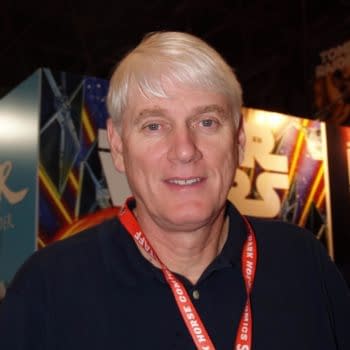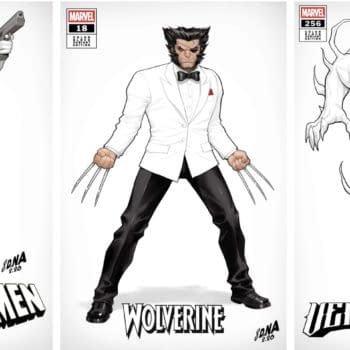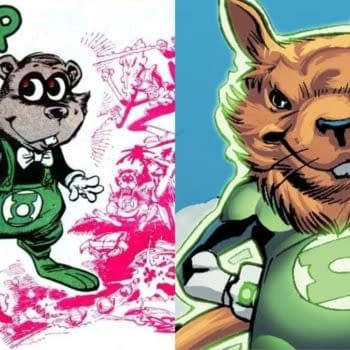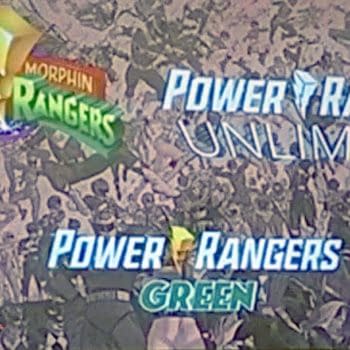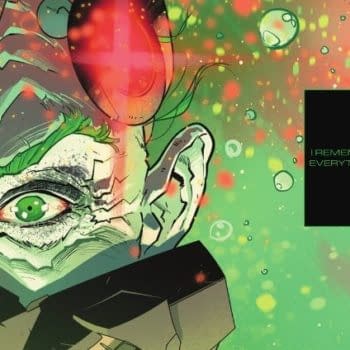Posted in: Comics | Tagged: Comics, entertainment
"No One Is There With You At 5am" Mario Rivas, Jeff King, Paul Jenkins On Comics To Hollywood (And Everything In Between) At The NJ Comic Expo
By Hannah Means-Shannon
On a panel hosted by Jeremy Atkins at New Jersey Comic Expo on Saturday, November 19th, about the relationship between comics and other forms of media like TV, film, gaming, and animation, the panelists included Mario Rivas, a native of Cuba, a filmmaker of children's animation, Jeff King, a writer and producer, including TV's Blindspot, as well as for DC and Marvel, and Paul Jenkins, whose comic work includes the origin of Wolverine, and has worked in games, and has written and directed animation for Nickelodeon, as well as working in augmented reality storytelling.
When the panelists were asked about their background, Rivas says that American animation like Tom and Jerry and Hana Barbera influenced him. In his 20's he joined a studio for animation in Cuba, where he trained to make animation since there were no schools for those skills at the time. For 40 years he's been making animated films, and he has also made some comics.
Jeff King wound up producing a pilot for Due South, about a Mounty in Chicago. That gave him the opportunity to "start learning the craft" with someone very experienced. As a Canadian, working on Due South helped him develop international humor. It led to more opportunities because the show was successful. He had written enough "terrible poetry and bad plays" to be ready to be successful, he said.
Paul Jenkins came to America from the UK when he was 20 years old and studied to become an actor. An English major in college, he was also into performing music, and likes to "make" his own creative projects. He worked on Inhumans and Hellblazer in comics, but was actually never a comics person. The advantage he had in comics, he feels, was that he was not a comics reader. The reason he did well, he feels, is because he could bring a "fresh eye" to characters like the Inhumans. He truly believes that comics are one of the oldest forms of human expression, and when he saw that video games could tell stories, despite naysayers, he wanted to do that, too. He became an innovator in how to make stories on multiple platforms. He does so many things outside of comics that fans rarely know about, like writing and directing an animated Ninja Turtles episode for Nickelodeon. He can't make his mind up, he said, in choosing between platforms.
Atkins asked the panelists how they "visualize" their work ahead of time.
Rivas said that he has a story ahead of time, how to accomplish it via characters, the practical aspects of background settings, and how characters will move through them, before starting.
Jenkins said that in working on video games, he would see that execs thought gameplay was everything, and were marginalizing story. He told them that if they ever brought story forward, they would have greater success. Now he sees games like Assassin's Creed, which prove his point. A game becomes an "event" when you have a great story to tell.
King said that he feels he's still learning how to take the feelings you have and turn them into a story expressed through character and plot, combining them in a successful way. Some writers find that "path through" their characters and story, but he feels like he's hit and miss. He has lots of scraps of paper that he may never go back to, but at the moment, it was something he wanted to express. The first step is writing it down, which may need to nothing.
Jenkins added that the "making of", and the "implementation of ideas", is everything. You have an initial idea, but then you have to proceed with "confidence", he said.
Atkins asked how the panelists feel that comics related to other media at the moment.
Rivas feels the relationship is very strong. King said "I don't know. I feel like, on the one hand that comics are an amazing IP at the moment. And yet, at the same time, I still read them as a fan". When he started working in comics, he saw that there was a "purity" in the relationship between the idea in a comic and the artwork to express emotion. In a comic it's a "much more precise and specific emotion that the picture is projecting and you only get to pick one at a time. They are more like poetry than prose". He sees a fundamental difference between comics and other media forms.
Jenkins pointed out that in film you can capture an emotion from a distance if necessary, but in comics, there's a specific choice you have to make. He gave the example of a last panel of a page with a new character arriving. In the comic panel, there is a limited choice of how to present that. It is so much more possible to make a mistake than in other media, he said. The reader could suppose, if you present a close up, that the character might have been present earlier and just not shown yet. The choices have to be that much more specific.
Gaming and film have totally different rules as well, from the player being a main character to an actor being a main character. Making sure that the story is always "in front" of the player in a game requires a lot of innovation and complexity. Building stories across every medium is a big challenge consequently. It's like the "wild west right now for storytelling", he said, with amazing potential.
Regarding their current work, Jeff King spoke about his work on Blindspot, a primetime show currently in its second season on NBC that features a woman dropped in Times Square covered in tattoos that give unusual clues and with no memory of her identity. She becomes caught up in government investigations into the tattoos which seem to predict incidents like terrorist activity and in the second season, it becomes a matter of whether she can be trusted, since it's clear she has paramilitary skills and possible anarchic ties of her own.
Paul Jenkins spoke about his comic Alters from Aftershock, which isn't specifically a transgender comic, though a central character is transgender, he said. The comic features characters who have aspects that marginalize them from society and are posed with a chance for "hyperadvantage" instead. They have to choose between states that have double-edged qualities. When asked what the "future of story" is, he feels that we've always moved people's emotions through story, and we will continue to do that through various developing forms of media, like augmented reality.
Rivas said he is finishing up a series of animated shorts and also has comics coming up.
Asked about how to become a successful creative person, Jenkins cited learning the craft of comics while working as an editor for Alan Moore and Neil Gaiman, as well as Dave McKean. He also emphasized work ethic over talent for gaining skill. He said, "No one is there with you at 5AM", and "only you can put in the effort" to make your career work and your creative projects come into being.
Both Jeff King and Paul Jenkins reminded the audience that they have stories in the anthology coming out in December, Love is Love, which will benefit people who need help and support following the Orlando nightclub shooting. Jenkins is also raising money through sale of Alters for charity this weekend at the New Jersey Comic Expo.







